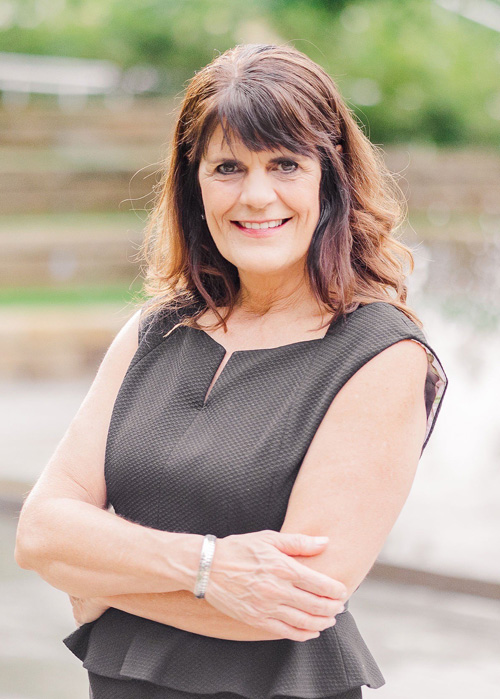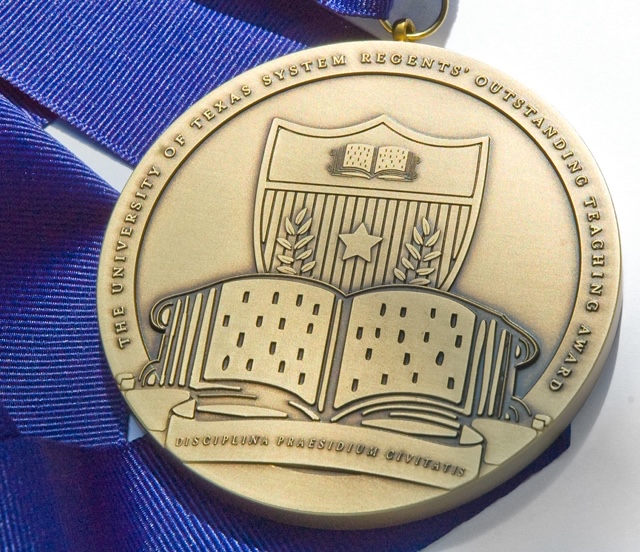
Carol Cirulli Lanham MA’09, PhD’11 views teaching at UT Dallas as a privilege that allows her to leverage the education she received in the UT System and “pay it forward.”
This month, the assistant dean of outreach and engagement in the School of Economic, Political and Policy Sciences (EPPS) and associate professor of instruction in sociology was honored for her extraordinary dedication to teaching. She was one of 14 recipients of the UT System’s 2021 Regents’ Outstanding Teaching Award (ROTA). The honorees represent 10 of the 14 UT System academic and health institutions and will be recognized virtually during a Board of Regents meeting in November.
Lanham holds a bachelor’s degree in economics and government from UT Austin and a Master of Science in Business Administration from Boston University. In 2005, she enrolled at UT Dallas, where she earned a master’s degree in applied sociology and a doctorate in public policy and political economy.
Her role model, she said, was her father, Antonio Cirulli, who was a master tailor and immigrated to the U.S. in the 1950s. Although he only completed the sixth grade, it was his regard for the value of education and his investment in Lanham and her siblings that enabled all three to become first-generation graduates of UT Austin.
“My entire family benefited from the quality education provided by the UT System, and I am truly honored and humbled to be able to help others achieve the same success.”
Carol Cirulli Lanham MA’09, PhD’11, associate professor of instruction in sociology in the School of Economic, Political and Policy Sciences
Lanham’s two sons continued the family tradition, too, graduating with electrical engineering degrees from UT Austin in 2019.
“My entire family benefited from the quality education provided by the UT System, and I am truly honored and humbled to be able to help others achieve the same success,” said Lanham, who is also an assistant director of the Center for Teaching and Learning. “While my father passed away many years ago, I am grateful that I could share this fantastic news with my mother, who now is back in Italy.”
Passion for Teaching
Teaching is actually Lanham’s third career. After working as a journalist and then in public relations, she began teaching sociology at UT Dallas in 2011.

Regents’ Outstanding Teaching Award
The UT System Board of Regents created the Regents’ Outstanding Teaching Award in 2008 to recognize exemplary service to students. Thirty-eight UT Dallas faculty members have received the award.
She said teaching is her favorite vocation. She especially enjoys sharing her passion for sociology with her students through active learning strategies.
In a community-engaged learning course that she has taught several times, her students were paired with homeless students at South Oak Cliff High School in the Dallas Independent School District.
“In the process, my students learned about class, status, power and social stratification by working with students from one of the city’s most impoverished areas,” Lanham said. “In written reflections, my students noted how the class changed their views of the world and made them more sensitive to the needs of others, and it did the same for me.”
Online Teaching Leader
Dr. Jennifer S. Holmes, EPPS dean and a 2011 ROTA recipient, said Lanham is not only a positive influence on her students, but she also makes a significant impact on her fellow faculty members.
“She is an innovator, a role model and a coach to her colleagues,” Holmes said. “Carol deserves this award for many reasons — one being that she led the pivot to primarily online instruction in the beginning of the COVID-19 pandemic. She offered virtual workshops and individual tutoring to help the rest of us get up to speed as we moved online.”
Lanham said, like most instructors, she faced significant challenges when moving from the traditional classroom to remote, online teaching. She was committed, however, to giving her students an experience that was just as good, if not better, than in the traditional classroom.
“She is an innovator, a role model and a coach to her colleagues. Carol deserves this award for many reasons — one being that she led the pivot to primarily online instruction in the beginning of the COVID-19 pandemic.”
Dr. Jennifer S. Holmes, dean of the School of Economic, Political and Policy Sciences
For Lanham, who has experience teaching online since 2012, jumping into action came naturally in March 2020.
“About 80% of UT Dallas faculty had not taught online before, so I started hosting daily sessions over the extended spring break, helping my colleagues adjust to the new normal,” she said. “I launched a similar initiative this past August when the classroom de-densification program was announced. Despite the hardships for both students and faculty, there were also benefits that emerged, including the introduction of virtual exchange into the curriculum.”
Growing Virtual Exchange
Before the pandemic, Lanham worked to expand the University’s international education program in Italy and Switzerland. She is now focused on expanding the virtual exchange program, which partners UT Dallas students with students in another country. Lanham said these types of courses enable the University to take students “abroad” virtually.
Bright Comets
To learn how UT Dallas is attracting the best and brightest students, explore New Dimensions: The Campaign for UT Dallas.
Along with Dr. Juan González, dean of graduate education and the Francis S. Johnson Chair for Graduate Education, and Sara Spiegler, director of international education, Lanham was awarded a UT System Curricular Innovation grant to further expand virtual exchange opportunities for students. And, as a Fulbright Specialist, Lanham aims to one day work with faculty in other parts of the world to expand their virtual exchange and online learning offerings.
“My goal is to make sure students learn core sociological concepts, as well as develop soft skills such as global and intercultural fluency, teamwork and collaboration, critical thinking and problem-solving, and technical skills such as digital competence,” she said. “To accomplish these goals, I bring the world to my students, and my students to the world.”
